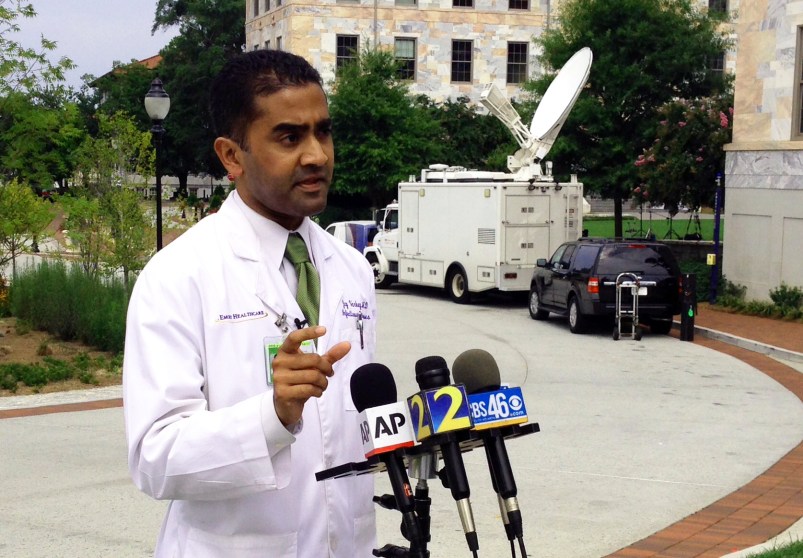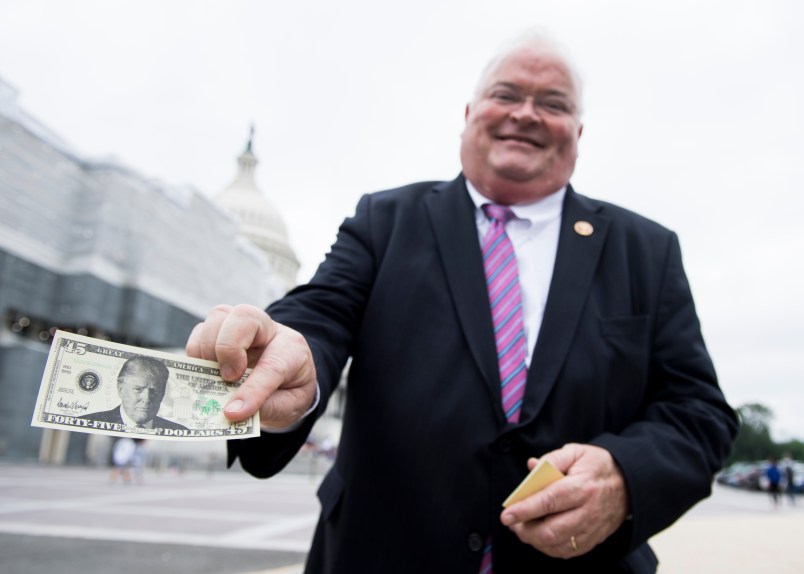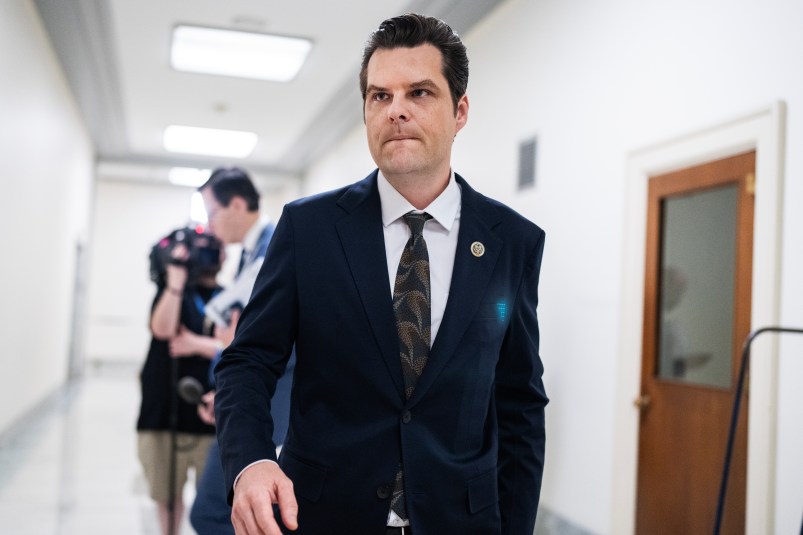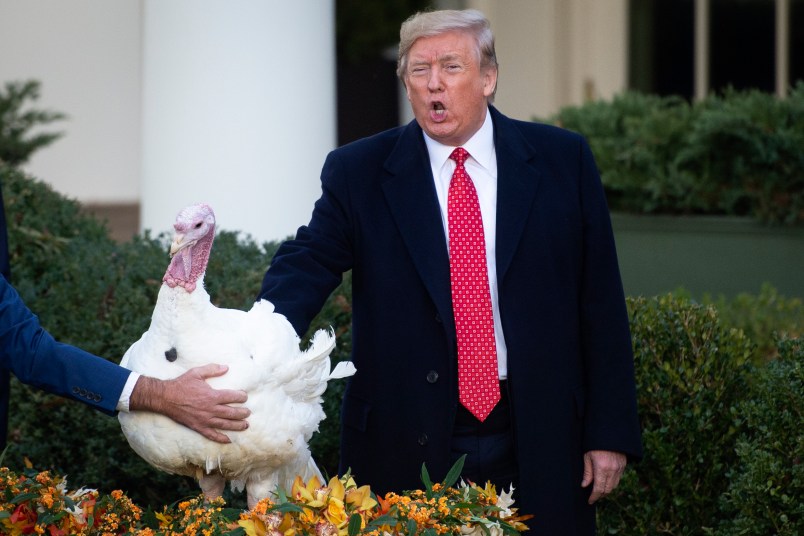Two American aid workers infected with Ebola are getting an experimental drug so novel it has never been tested for safety in humans and was only identified as a potential treatment earlier this year, thanks to a longstanding research program by the U.S. government and the military.
The workers, Nancy Writebol and Dr. Kent Brantly, are improving, although it’s impossible to know whether the treatment is the reason or they are recovering on their own, as others who have survived Ebola have done. Brantly is being treated at a special isolation unit at Atlanta’s Emory University Hospital, and Writebol was expected to be flown there Tuesday in the same specially equipped plane that brought Brantly.
They were infected while working in Liberia, one of four West African nations dealing with the world’s largestEbola outbreak. On Monday, the World Health Organization said the death toll had increased from 729 to 887 deaths in Guinea, Sierra Leone, Liberia and Nigeria, and that more than 1,600 people have been infected.
In a worrisome development, the Nigerian Health Minister said a doctor who had helped treat Patrick Sawyer, the Liberian-American man who died July 25 days after arriving in Nigeria, has been confirmed to have the deadly disease. Tests are pending for three other people who also treated Sawyer and are showing symptoms.
There is no vaccine or specific treatment for Ebola, but several are under development.
The experimental treatment the U.S. aid workers are getting is called ZMapp and is made by Mapp Biopharmaceutical Inc. of San Diego. It is aimed at boosting the immune system’s efforts to fight off Ebola and is made from antibodies produced by lab animals exposed to parts of the virus.
In a statement, the company said it was working with LeafBio of San Diego, Defyrus Inc. of Toronto, the U.S. government and the Public Health Agency of Canada on development of the drug, which was identified as a possible treatment in January.
The drug is made in tobacco plants at Kentucky BioProcessing, a subsidiary of Reynolds American Inc., in Owensboro, Kentucky, said spokesman David Howard. The plant “serves like a photocopier,” and the drug is extracted from the plant, he said.
Kentucky BioProcessing complied with a request from Emory and the international relief group Samaritan’s Purse to provide a limited amount of ZMapp to Emory, he said. Brantly works for the aid group.
The Kentucky company is working “to increase production of ZMapp but that process is going to take several months,” Howard said. The drug has been tested in animals and testing in humans is expected to begin later this year.
The U.S. Food and Drug Administration must grant permission to use experimental treatments in the United States, but the FDA does not have authority over the use of such a drug in other countries, and the aid workers were first treated in Liberia. An FDA spokeswoman said she could not confirm or deny FDA granting access to any experimental therapy for the aid workers while in the U.S.
Writebol, 59, has been in isolation at her home in Liberia since she was diagnosed last month. She’s now walking with assistance and has regained her appetite, said Bruce Johnson, president of SIM USA, the Charlotte, North Carolina-based group that she works for in Africa.
Writebol has received two doses of the experimental drug so far, but Johnson was hesitant to credit the treatment for her improvement.
“Ebola is a tricky virus and one day you can be up and the next day down. One day is not indicative of the outcome,” he said. But “we’re grateful this medicine was available.”
Brantly, 33, also was said to be improving. Besides the experimental dose he got in Liberia, he also received a unit of blood from a 14-year-old boy, an Ebola survivor, who had been under his care. That seems to be aimed at giving Brantly antibodies the boy may have made to the virus.
Samaritan’s Purse initiated the events that led to the two workers getting ZMapp, according to a statement Monday by the National Institute of Allergy and Infectious Diseases, part of the U.S. National Institutes of Health. The Boone, North Carolina-based group contacted U.S. Centers for Disease Control and Prevention officials in Liberia to discuss various experimental treatments and were referred to an NIH scientist in Liberia familiar with those treatments.
The scientist answered some questions and referred them to the companies but was not officially representing the NIH and had no “official role in procuring, transporting, approving, or administering the experimental products,” the statement says.
In the meantime, dozens of African heads of state were in Washington for the U.S.-Africa Leaders Summit, a three-day gathering hosted by President Barack Obama. U.S. health officials on Monday spoke with Guinean President Alpha Conde and senior officials from Liberia and Sierra Leone about the Ebola outbreak.
The Defense Department has long had a hand in researching infectious diseases, including Ebola. During much of the Cold War period this served two purposes: to keep abreast of diseases that could limit the effectiveness of troops deployed abroad and to be prepared if biological agents were used as weapons.
The U.S. military has no biological weapons program but continues to do research related to infectious diseases as a means of staying current on potential threats to the health of troops. It may also contribute medical expertise as part of interagency efforts in places like Africa where new infectious disease threats arise.
The hospital in Atlanta treating the aid workers has one of the nation’s most sophisticated infectious disease units. Patients are sealed off from anyone not in protective gear. Ebola is only spread through direct contact with an infected person’s blood or other bodily fluids, not through the air.
The CDC last week told U.S. doctors to ask about foreign travel by patients who come down with Ebola-like symptoms, including fever, headache, vomiting and diarrhea. A spokesman said three people have been tested so far in the U.S. — and all tested negative. Additionally, a New York City hospital on Monday said a man was being tested for Ebola but he likely didn’t have it.
Writebol and her husband, David, had been in Liberia since last August, sent there by SIM USA and sponsored by their home congregation at Calvary Church in Charlotte. At the clinic, Nancy Writebol’s duties included disinfecting staff entering or leaving the Ebola treatment area.
“Her husband, David, told me Sunday her appetite has improved and she requested one of her favorite dishes – Liberian potato soup — and coffee,” SIM’s Johnson said.
___
AP writers Krista Larson in Dakar, Senegal, Mike Stobbe and Stephanie Nano in New York, and Robert Burns in Washington contributed to this report.










I heard about this on NPR earlier today. The treatment is derived from the blood of a few people who managed to survive the disease and had developed protective antibodies in their blood, very similar to the method we now use to treat for tetanus.
And does it seem weird to anyone else that tobacco companies are involved in the search for a cure?
CNN’s version implied that the FDA did act under “compassionate care” provisions. Since the company was from San Diego, it’s hard to envision them just shipping drugs to other countries without FDA approval.
Apparently the FDA didn’t hear the part about how government isn’t supposed to do anything right and only gets in the way. Sounds like they approved something very out-of-the-norm and may have saved two lives as a result.
Let’s hope this medicine gets fast tracked for “compassionate care” for Africans caught in the epidemic, too.
That and apparently a long standing Defense Department involvement
Producing foreign proteins in tobacco plants (and cells) is an old biotechnology trick. The plants pretty much become protein factories, and you can grow a lot of them. It is very cost effective and safer in some regards compared to other methods to mass produce biotech products. I did experiments along those lines several years ago. It was kinda fun imagining how this scourge of humanity could be turned to do some good.
“The hospital in Atlanta treating the aid workers has one of the nation’s most sophisticated infectious disease units.”
And, if they get in over their heads, it’s only a half-mile up Clifton Road to CDC headquarters, where they know all about safely managing infectious disease!